Get posts by email
Our Elementary Homeschool Curriculum
August 8, 2012
This post was originally published when our kids were 13, 11 and 9. It was part of an elementary homeschool series.
That series was published in fits and starts and was never quite finished, the way I intended it to be. Sure enough, my kids left the elementary years, moving onto their middle and high school years, and my writing energies shifted elsewhere.

I've since updated this post to explain, at-a-glance, our family's elementary homeschool curriculum. No longer part of a neglected series of posts, but a landing page that explains our homeschool goals and the curriculum outline I created from those goals.
- Growing and nurturing your child's natural love of learning.
- Practical ideas for when, how, and if to start lessons.
- Inspiring your children by pursuing what you love.
- Balancing home and homeschool.
- Homeschooling in the freedom of knowing who you are and who your children are.
- How to organize your days and seasons for learning and living together.
Our Goals:
Before I talk about our curriculum I need to talk about our goals. You build a curriculum around your family values and educational goals - not the other way around.
We value growing in our faith, being together, experiencing nature and adventure, healthy living, and freedom in education and livelihood. We appreciate beauty and creativity, building relationships and community, and living simply.
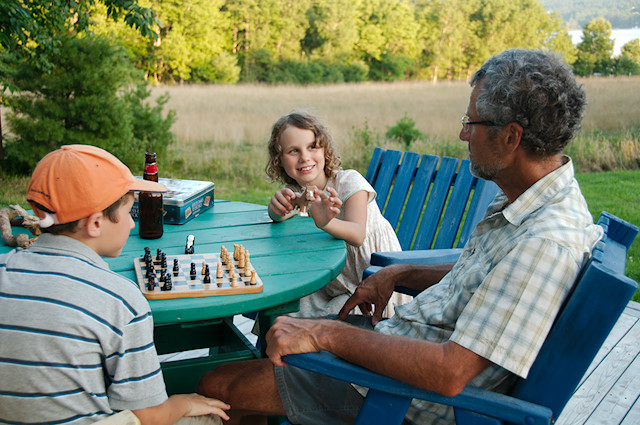
These values are motivating factors in how we educate our kids. Our specific educational goals are woven throughout my writing, but most explicitly expressed in this post. I revisit these goals each school year, expanding and refining as necessary.
From the very start we have been committed to homeschooling our kids from beginning to end. Birth to whenever they say, “I’ll take it from here Mom and Dad”. And even then, we want to support and assist their endeavors.
Unlike a lot of families who have a “take one year at a time" approach or “we’ll do this as long as it works for us”, homeschooling is the only option we’ve ever considered for our children’s education.
Making the decision to homeschool long term vs. one year at a time means we don't think about keeping pace with the school system in order for possible entry. This brings huge freedom to our homeschooling. I wouldn’t trade this freedom for anything.
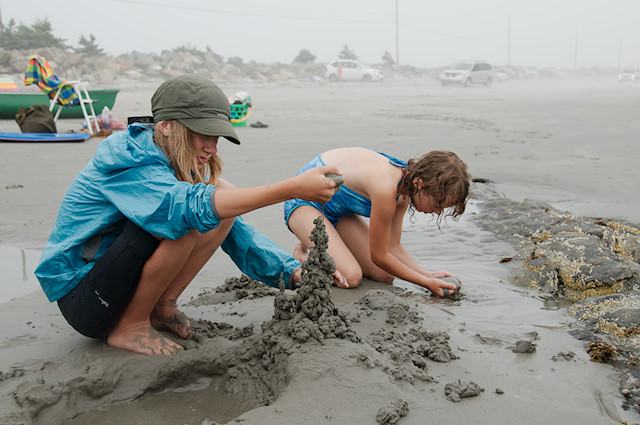
The goal for us is different than what a conveyer belt education offers - where children are taught a standard curriculum and kept with their age group regardless of interest, experience, or skill.
Our goal is to raise inspired, interest-driven, creative, and independent thinkers who are firmly grounded in familial love and Biblical values. And so, what the public or private school system teaches and expects of students at grade 3 or 5 or 10 is of little concern to me. What a homeschool curriculum company teaches and expects of students at grade 3 or 5 or 10 is of little concern to me.
All that to say, we don’t use the typical grade level metrics as our standard. This post from Sarah Small on Stepping Outside the Grade-Level Box explains beautifully how I feel about grade levels. They don’t matter, not to us at least.

What about High School?
People always ask this when they find out you aren’t keeping in step with “the system”. Even if we’re just talking about elementary school, they want to know about high school and then college. I'm not discussing college in this post, but I'll briefly address high school.
We plan to homeschool through high school years. If our children want to go to a public high school and can present a compelling case as to how it helps them reach their goals then we will consider that option.
However, our children LOVE having freedom in their days. And they know, in part, how blessed they are to determine they own destiny. If they decide someday to go to school they’ll be doing so from a place of emotional, spiritual, and intellectual security.
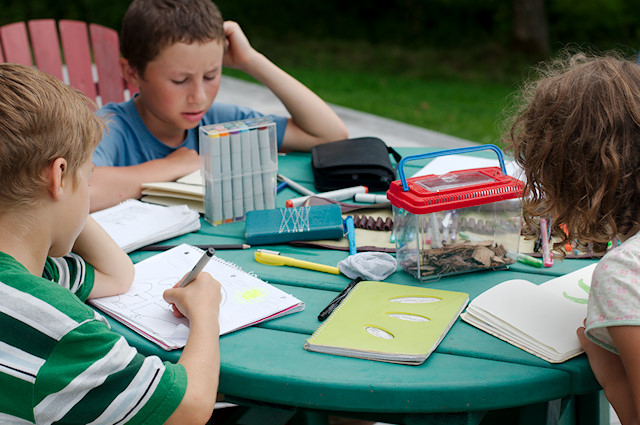
But how will they re-enter the system (if they want to) if we haven’t kept pace with it? I have two main thoughts about that:
- Where there’s a will there’s a way. I absolutely believe this, as our family has lived out so many of our dreams through creative problem solving and hard work. If my kids need to learn x or z to start grade 11 at the local school (for example) we’ll figure out how to make it happen, when and if the time comes.
- We’re raising learners and we trust in the inherent, hardwired learning process, especially since we haven’t snuffed out their natural curiosity in their elementary years. A homeschooling environment allows for many different ways to learn and acquire knowledge. My kids may not have have been taught elementary science in textbooks and worksheets, but that doesn’t mean they haven’t learned the fundamentals of science that are needed for junior high and high school level study.
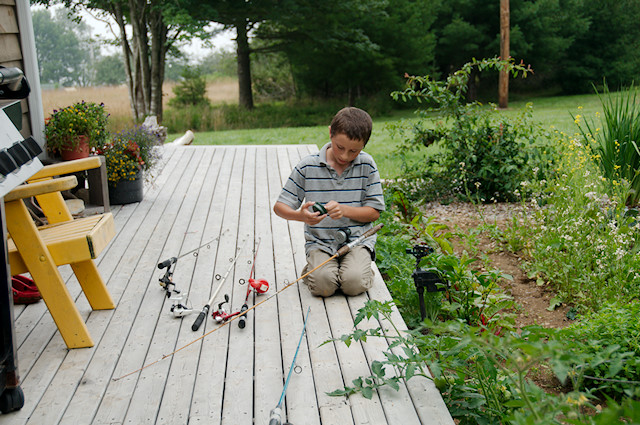
Curriculum ~ A Definition:
Our elementary curriculum is designed to meet our children's unique and specific needs and work towards our family’s goals in the context of everyday living.
Before I go further I need to define the problematic word curriculum. In the homeschooling context, when most people ask, "what curriculum are you using?", what they are usually asking is, "what packaged materials and ready made guidelines are you following to teach your children at home?"
As a trained educator, having studied a bit of curriculum design in my degree program, and a homeschool parent with years of experience, this is how I define curriculum:
A curriculum is a course of study.
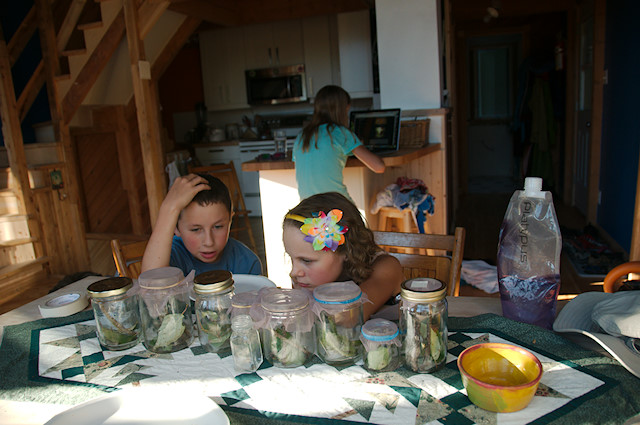
By this definition, curriculum is not limited to a package of materials or a computer learning program. Curriculum is a complete course of study which may include ready made materials and resources (and usually does) but is not limited to those resources.
So when people ask me, as they often do, “Do you use a curriculum to homeschool your children?” I don’t know how to answer because what they usually mean is, “Do you use a packaged program or follow the state/provincial guidelines?” The answer is no.
But of course I follow a curriculum - our own. And no, it’s not a scope and sequence I designed before we started or a detailed plan I write out in September and then lesson plans I prepare each Sunday for the following week.
Our homeschool curriculum is a living thing, just like our days. It’s everything we do and study. It’s crafts, books, cooking, math practice, hiking, playing, writing e-mails, drawing, sewing, lots of discussions, journal entries, internet research, documentaries, bored afternoons, exploring the woods, etc.
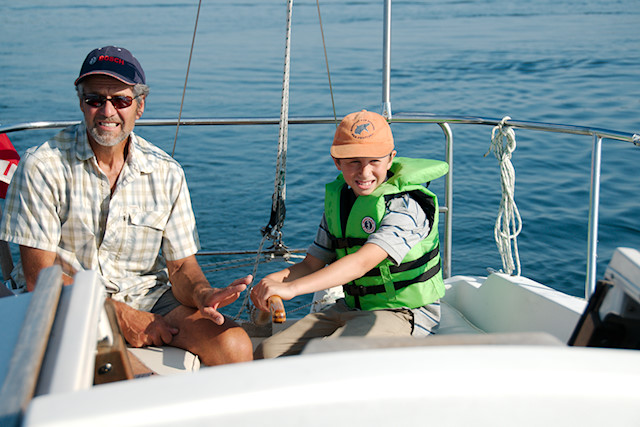
Do you see what I’m getting at here? I don’t want to hammer this point too much but these definitions matter to me.
We have a curriculum, a course of study, it’s called life. And we live it, study it, take it apart and put it back together, every day.
To break it down further we have an elementary homeschool curriculum that includes studying many subjects, some woven into our everyday activities, some practiced on their own to build skill and lay a foundation for further learning.
To break it down further we have an elementary homeschool writing curriculum which includes many activities. Some from packaged resources and some not. As the facilitator/teacher, I read materials to become a better coach and mentor, so I can inspire writing in our home. We have times where we practice together and many more times where children do their own writing, or not. I pull together, rather informally, a whole bunch of ideas and activities to build our elementary writing curriculum or course of study.
Building your own course of study this way is not as hard as it sounds.
In the example of our writing curriculum, I’m not preparing writing lesson plans. Mostly I’m setting an example in my daily writing practice, making time to write together, making tools available (ie: letting kids use my computer and nice handwriting tools), teaching basic skills, and then recording what happens naturally in an interest-driven learning environment. I prefer to keep record of what actually happens instead of making unrealistic plans that we can't follow through on.

Our Curriculum:
Having said all that, the following subjects are the academic core of our elementary homeschool curriculum:
- Math
- Science & Nature Study
- Reading
- Writing - I haven't written many posts dedicated to elementary homeschool writing, and no explicit "this is how we do it" posts. I heartily recommend Brave Writer philosophy and products. Our homeschool elementary writing curriculum roughly lines up with the Jot it Down and Partnership Writing stages, as taught and explained by Julie Bogart.
- World Study
We also study, through reading, discussions, travel, outdoor adventures, relationships, play, experiments, community involvement and everyday living, the following:
- Bible & Character Formation
- Physical Education & Outdoor Adventuring
- Art, Dance & Music Appreciation
- Fine Art & Handicrafts
- Homemaking & Entrepreneurship

woodshed musical theatre
That's the shortened at-a-glance version of our elementary homeschool curriculum, our course of study.
You can find all the "how-to" type posts I've written on homeschooling, preschool through high school, at my Homeschool Help Resource Page.
Filed Under
Resource Library
-

Julie on Aug. 8, 2012, 4:50 p.m.
Hi Renee, I love your blog (recently bought your book!) and have just read through your series on reading, especially about your son. I just wanted to throw this out there for you to consider. My younger daughter had some similar struggles with reading, and like Laurent, gravitated towards graphic novels, comics -- things with pictures. We found out she has/had a visual tracking problem called convergence insufficiency. This is NOT a visual acuity problem -- she had 20/20 vision. And it's not a problem like lazy eye or strabismus/ So a standard vision exam will not find this issue, as kids with tracking problems can focus long enough to read things like the eye exam letters but cannot track lines of text. There is a particular exam given by doctors who are specialists in binocular vision. While we all hope our kids don't have struggles like this, one blessing of finding this problem is that it was VERY treatable through vision therapy, which is entirely non-invasive and totally med-free. The doctors re-train the tracking muscles of the eye via various exercises. My daughter went once a week for 10 weeks to vision therapy and did exercises at home. It completely changed her reading. She went from reading comics to (voluntarily) reading long books like the Hunger Games. We learned that many kids have vision tracking problems that are not caught or are misdiagnosed (as ADHD or dyslexia) because they are not evident via standard exams. And it is shame because it is such a treatable issue, and much of the treatment can be done at home. My daughter loved the therapy. We are lucky in that the major university near us (UC Berkeley) has a school of optometry and a specialized binocular vision clinic that is a leader in this therapy. Anyway, you may have already thought about this with Laurent, but if you haven't you might want to consider it. Here are some links (sorry I don't know of any Canadian ones).
http://www.convergenceinsufficiency.net/
The clinic we went to:
http://cal-eye-care.org/services/binocular-vision-exams
If you google you will probably find some links dismissing vision therapy -- however, it literally changed my daughter's life, and there are many pediatric optometrists (like those at UC Berkeley) who have gathered much clinical data supporting this therapy. And as I mentioned above, since it is non-invasive, med-free and fun for kids if done properly, I had no hesitation about trying it, and thankfully, it worked. Good luck!
-

Beth on Aug. 9, 2012, 2:45 a.m.
Julie,
We're on the vision therapy journey right now. Ours is 20 weeks with daily practice, and it is making a difference for our son. When he looks back on what he's able to do now that we're doing vision work, he's proud of himself. Every day, however, he does not like the exercises because most of them are challenging for him....until he gets them. Then, he's happy. His reading has improved, and he often has his nose in a book now and is thrilled about it.:)
-

Julie on Aug. 9, 2012, 9:31 p.m.
I am glad to hear it is working for you son! It really did work for my daughter too. :)
-
-
-

Clare on Aug. 8, 2012, 6:24 p.m.
Thank you for this post! And the ones to follow! I have been reading all your homeschooling archives, and even wrote to you about what an inspiration you have been to my homeschooling life! :)
Funny thing is, I have been overwhelmed by homeschooling my little ones, but I was in fact homeschooled through middle and high school. My mom kept us on-par with Math, but was relaxed about everything else. We went hiking/backpacking on a weekly basis and when I began taking college classes at 16, I was 5 steps ahead in all the subjects. If you think about it, most high school curriculum gets repeated in college (atleast in the states) and you get credit for it. I am sure your children will be way ahead of the game thanks to your relaxed schooling and exposure to real life. :)
-

Leah on Aug. 8, 2012, 6:30 p.m.
Renee, I have yet to have children and I am inspired!!! I can't wait to read you 'Elementary Years Homeschooling' Ebook!!! hint hint, nudge nudge ;) ;)
-

Michelle on Aug. 8, 2012, 8:40 p.m.
Excellent overview Renee. I am looking forward to reading the rest.
-

Kelly on Aug. 8, 2012, 9:10 p.m.
Renee,
Your post really resonates with me. The way you approach homeschooling your children and your course of study is how I'd like to homeschool my children as we begin homeschooling for the first time this year. However my state requires that students take a standardized achievement examination and pass tests at grade level or else be subject to more testing. This has compelled me to implement more "packaged curriculum" than I feel comfortable with in order to make sure that we are at "grade level." Now that you've moved from Maine do you have such standards, laws, etc. that you must adhere to? Any thoughts related to this? Thanks.
-

renee on Aug. 16, 2012, 11:58 a.m.
Kelly, I would encourage you to find the unschoolers support group in your state and find out how they manage to mee the requirements. Even if you don't identify as an unschooler they might be able to help you with this unique concern.
-
-

San on Aug. 8, 2012, 10:30 p.m.
As always you've given me food for thought and when i'm less tired I will re-read this post.
Celine's doll is absolutely gorgeous, such talent and what a lot of patience in the entire process from research to the finished gift. There is an ETSY shop in the making for sure.
San x
-

Beth on Aug. 9, 2012, 2:55 a.m.
Tell me about the caterpillars adorning your table. We've been feeding Monarch caterpillars (our setup looks similar) on our kitchen table for few weeks and then watching them in their pupal phase. This morning, another Monarch emerged.
Thanks for another "food for thought" post. I look forward to your elementary homeschool curriculum series.
-

Anastasia @ Eco-Babyz on Aug. 9, 2012, 3:09 a.m.
You must have been reading my mind. Again. :) Just yesterday I was thinking about it, my daughter turning four soon. I was thinking that it is so tempting to get a curriculum and I can probably get one free to review on my blog - at the same time reminding myself that the elementary years are something I just want to have fun with and not worry about. I don't want concrete schedules and every day written out. I want to have the freedom you describe. I would have to say that being 'relaxed homeschoolers' is something that jives with us because we are 'relaxed lifers' :)) We don't like to rush. Now what do I tell the grandparents, they don't really get it. They have been through rigors of the school system abroad and they don't know anything outside of the rigid "You MUST learn" approach. I'm looking forward to reading this!
-

Catherine Forest on Aug. 9, 2012, 3:35 a.m.
Renee, I really value your experience and really relate to your vision. I can't wait to read more!
-

Candelion on Aug. 9, 2012, 5:23 a.m.
Hi Renee! Haven't commented in awhile, but let me just start off by saying I completely support your method. I was actually quite jealous for some time that I didn't get to live that childhood. However, as I was reading this post, I realized that the curriculum (life) you describe is what I did outside of school on weekends and during breaks and at the dinner table. I also realized that I played a lot of team sports through school, which was a huge part of gaining confidence, self esteem and learning to truly get along (or not) with others outside my family on a regular basis. I think public school also helped me grow and learn that I'm not always going to like every little part of life. Sure, I can see the positive in most things, but I'm not sure that I would have developed the ability to do well in the things I don't like. And I'm not saying it's been all cake for you or your children, life can be hard in any package.
If I decide to have children, I would still love to homeschool. I guess I'm just questioning whether or not I could teach the skills to deal with the well, crap that often arises in social circles and even some of the most professional atmospheres.
Anyway, I hope this doesn't come off the wrong way.. Just my thoughts at the moment. Of course, I always look forward to your posts and am so inspired by your family's quest over these last few years. I am trying to live my dream too, which is never a small feat. Much light to you all.
-

Johanna on Aug. 9, 2012, 11:57 a.m.
You have no idea how I am excited about this! My oldest is 4 1/2 and I am starting to think more seriously about exactly what I plan to do. I just picked up "How Children Learn" by Holt.
I was homeschooled all the way through, so that doesn't exactly scare me. But what does, is this letting go of boxed curriculum. I really believe that I can teach them more without it, but it still feels "safe."
I, also, have two degrees in education, am passionate about how children learn, but I still fear doing something outside the mold. I can't tell you enough, how much your blog and your family's story is inspiration.
-

Jill Foley on Aug. 9, 2012, 4:43 p.m.
I would LOVE To know about your kids' compassion education! : ) That's the important stuff in my book.
-

Pamela on Aug. 9, 2012, 11:21 p.m.
A lovely post, Renee! While I don't homeschool, we still do a lot of home education in both academic and non-academic subjects. We believe in continuous learning, not just what is going on in the standard school day. I'm very interested to here about your compassion education, Bible study, and character formation. These are areas I struggle in, because I can't figure out the best way to approach them. (We shepherd our children, of course, but I would like to have a more cohesive plan in mind as to what I'm trying to achieve!) I am, unfortunately, not well versed in the Bible, so I have struggled with catching up myself and figuring out how to pass it on at the same time. Any light you can shed would be very helpful. Thanks!
-

renee on Aug. 10, 2012, 12:57 a.m.
I'm actually not going to be writing about any of that in-depth any time soon. I do heartily recommend Telling God's Story for Bible instruction overview. We don't use the curriculum but they way it lays out teaching the Bible to our children makes a lot of sense to me and gave me a framework to use. The bible is a big book afterall, where do you even start? And honestly compassion education is simply values we instill in our children through everyday family living. You have to learn compassion and kindness when spending large chunks of time with the same people. (And in a bunch of other contexts, but that's all I'm referring to in this post). It's nothing complicated. Just like adventure education, it's just something we do. I didn't mean it in any official way. And character formation is the same. Nothing formal, just life lessons "trials produce perseverance, perseverance character; and character, hope" - along those lines. Someday maybe I should write more about this, just don't have the time right now. These are not "Sunday" teachings, or reserved for religious servicees, they are everyday living subjects.
-
-

Rana on Aug. 10, 2012, 3:03 a.m.
Renee, as always my "Homeschool Mommy Mentor" I wait with baited breath for the rest of your post. I was wondering when you were going to get back to this series. I love your insight on defining what curriculum is. It makes so much sense. Now how do I explain to people that what I do isn't really "Homeschooling" but "life schooling"?
-

renee on Aug. 10, 2012, 11:11 a.m.
Rana, I'm not sure if your question is rhetorical or actual, about explaining to people. I'll pretend it's a real question. I have different answers for different people, depending on how open I sense they are to alternative education and interest-inspired living. Depending on who I'm with, and how open I feel they are (I don't like being attacked), I will share different answers - both honest but from different perspectives. Some people, are really concerned that our children will "not learn what they need to know" so I tell them about the math resources we use etc. That makes them feel better (smile). These are people by the way the don't know our children well. Because once you know and love people you accept them for who they are. Other people are more open so I will share my philosophical viewpoints and strongly held beliefs for freedom in learning and education. And then I talk about our everyday living curriculum. So, it really depends who I'm talking to.
-
-

Kate on Oct. 16, 2012, 8:41 a.m.
I'm re-reading this again as a link from your most recent post and I just wanted to thank you for settling my heart and my head again. Our son is coming out of school next week (he's 7) for all the reasons you give for wanting to home-educate your own children. And while I'm excited about the change, today I've been worrying about my ability to explain (as I fear I'll have to - more than once!) how we see it working in practice. You so beautifully express your own journey, you've given me back my confidence to talk about our own.
You can subscribe to comments on this article using this form.
If you have already commented on this article, you do not need to do this, as you were automatically subscribed.






Tina on Aug. 8, 2012, 3:06 p.m.
I think this is one of my favorite posts you've written, and puts into words the feeling in my heart and mind of how I envisioned our homeschool years. With a 13.5 year old (and 12 year old) we are in a similar place, anticipating the high school years. I do hope you don't wait too long to indulge us with your ideas for this phase of learning and growing. Having homeschooled from the beginning, looking forward to the young adult years are the most exciting, yet knee-shaking yet! I will look forward to hearing your thoughts on that...